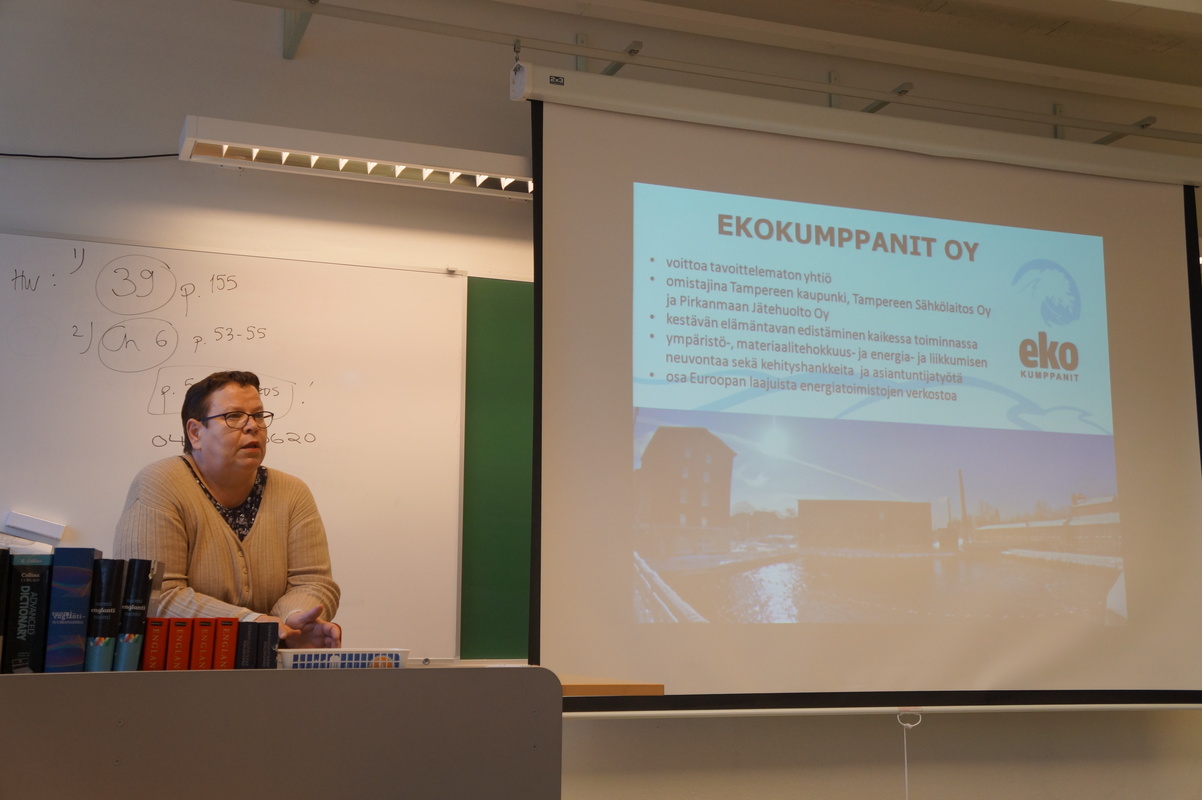On 28.10. Suvi Holm from Ekokumppanit visited us

Suvi Holm, the CEO of the non-profit organisation Ekokumppanit described their business activity to us, discussed topical environmental challenges, named some eco-enterprises and commented on our ideas for ecological initiatives.
An excerpt from a participant's learning diary:
This time the CEO of Ekokumppanit visited us in order to present their organisation and their activities.
She told us many interesting things, and I want to list a few here, which particularly stayed in my mind and interested me.
- Ekokumppanit Oy is a non-profit organisation who think that being active is what counts. Without being active there is no change. Apart from knowledge we also need activity.
- People often use a lot of different terms to describe the same thing. For this reason, ecology and other environmental activities can sound distant and frightening and very difficult to achieve. However, you don't have to see things as difficult, because you can actually achieve a lot with little effort. Everyday choices matter a lot!
- There are a lot of solutions that save the nature; less is more, renewable materials, organic food and local products, from products to services, recycling, borrowing, sharing, energy efficiency and many more. We have everything on earth, so why would we not use everything in a wisely and with a long-term perspective? I am sure we all want to preserve the diversity of nature, the production of quality food, clean water and as clean and fresh an air as possible.
- The importance of circular economy will raise in the future, which means, that the life span of products will be prolonged and they can be reused. We will also be using natural and eco-friendly materials etc. Cotton for example is very bad for nature, because growing it needs a lot of water and harmful pesticides. We must find other materials to replace it.
- Ekokumppanit wants to make change and inform people more and more. Therefore they organise lectures, events, training, publish animations and e.g. hand out stickers that reming to switch off the light at schools.
The first and foremost thought is that we are all in the same boat and creating change for the future
- Allthough people know, what would be the right thing to do, they do not act accordingly. We know, we should eat healthily and go to gym regularly in order to stay in good health, but yet we do not. The same goes for environmental issues.
- Only 20% of all consumers are willing to pay extra for an ecologically produced product. Many of those 20% travel to Thailand for their holidays once a year, and thus the ecological benefits gain from the ecological choices in the daily shopping are lost. In order to make real change, you have to find the will.
- Even though an eco-entrepreneur has a vision of a better world, an eco-entreprise is still a business that relies on the paying customer. You need to have something to offer. In Juupajoki, Finland a farmer quitted farming and now business people come from ia. Germany to stay there over the weekend in total quietness. They have to switch of their phones and computers and just go to the sauna and enjoy the nature. If you can offer something adventurous to your customers, they will maybe not travel to Thailand but stay closer and make smaller carbon footprints.
Kommentit
Kirjaudu sisään lisätäksesi tähän kommentin